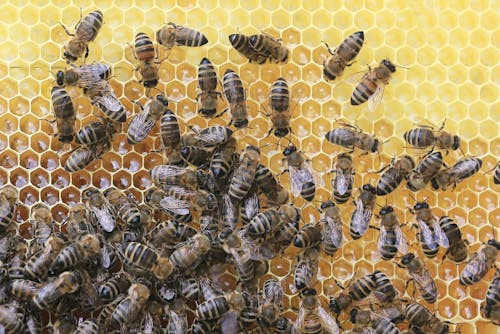 |
| Photo from pexels.com |
The average honey bee colony contains 50,000 bees, with the majority being worker bees whose role is to collect nectar for the hive. One hive can produce 14 KG of honey. That seems like an awful lot for one hive so is it really an issue for us to have some honey? To make 0.45 KG of honey the hive will have to get to two million flowers and travel around 55,000 miles to do this only for us to steal the majority of their food collected which, in my opinion, doesn't seem very fair to the the poor hard working bees. With CCD increasing in concern, we should be giving the bees the best chance for survival and that means ensuring that they have enough food to survive and reproduce.
To increase honey production, some beekeepers, mainly in the US, have resorted to artificial insemination to increase the number of drones in the hive, thus increasing the pollen collected. Although very few beekeepers are doing this is does mean killing at least one drone in order to collect the semen. The head and first segment of the body are crushed in order for the muscles to contract, making it easy to collect the semen. The queen bee is then held down via hooks in order to be inseminated which can lead to injury and possibly death of the queen. There have also been some cases where the queens wings have been clipped to prevent any chance of her flying away. With bee population becoming so scarce, should we be killing bees in order to artificially increase honey production for human consumption?
Despite these issues there are many other reasons for a declining bee population that don't involve honey. There is an argument that bee farms increase populations by increasing the amount of hives, planting flowers and reducing pesticides to increase bee populations. Bees in honey hives will also pollinate the surrounding area, helping to increase plant biodiversity which is the base of every food web, in turn supporting larger mammals in the area. It has also never been proven that there is a link between honey production and declining bee populations and there are many things we can do to limit the impact honey production has on bees. One thing could be to ban artificial insemination and limit the amount that can be taken form a single hive. So this begs the question, should governments be doing more to reduce our impact rather than stop eating honey altogether?
Personally, I think that ethically it isn't right for us to take the honey from the bees especially seeing as the entire hive is built around it. There are so many other alternatives, such as maple syrup, agave and date syrup, all derived from plants essentially cutting out the middle man. With bees being so important and becoming so scarce, shouldn't we be doing everything in our power to protect them?
Resources -
https://phys.org/news/2016-01-complex-worldwide-bee-declines.html
http://www.bbc.co.uk/guides/zg4dwmn
https://friendsoftheearth.uk/bees/honey-ethical-guide
https://www.peta.org/issues/animals-used-for-food/animals-used-food-factsheets/honey-factory-farmed-bees/